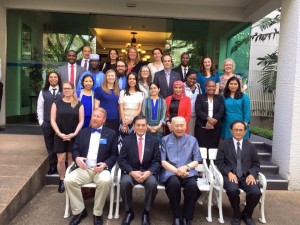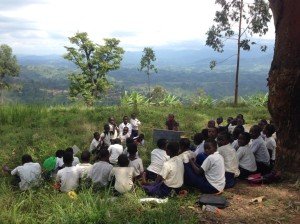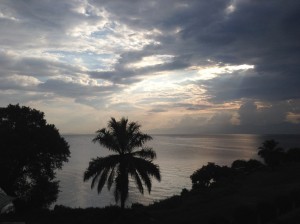บุรุษผู้รักษาคำมั่น
เราได้สนทนากับว่าที่ประธานโรตารีสากล จอห์น เจิร์ม
วันที่จอห์นเจิร์มเข้าปฏิบัติหน้าที่ในตำแหน่งประธานโรตารีสากลในเดือนกรกฎาคม คือวันที่เขามีสมาชิกภาพในโรตารีครบ ๔๐ ปี และในช่วงเวลาที่เป็นโรแทเรียนเขาได้สร้างผลงานยิ่งใหญ่ไว้เช่น การเป็นผู้นำโรตารีท้าทายกองทุน ๒๐๐ ล้านเหรียญสหรัฐเพื่อสมทบกับมูลนิธิบิลล์แอนด์เมลินดาเกทส์ เป็นผลให้โรตารีสามารถระดมทุนได้มากถึง ๒๒๘.๗ ล้านเหรียญสหรัฐ เพื่อใช้การกิจการรณรงค์สร้างภูมิต้านทานโปลิโอแก่เด็กทั่วโลก "ผมเชื่อว่าพวกเราประสบความสำเร็จในการหาทุนก้อนนี้ได้แน่นอนอย่างไม่มีข้อสงสัยใด ๆ" เขากล่าว "โรแทเรียนเป็นคนที่มีน้ำใจดีมาโดยตลอด" นี่คืออนุสาวรีย์แห่งความทรงจำที่นำเอาองค์กรนี้ไปสู่ความสำเร็จในการขจัดโปลิโอดังที่เห็นในทุกวันนี้ เราเห็นบทบาทความเป็นผู้นำของเจิร์มอย่างชัดเจนในผลงานมากมายและการระดมเงินทุนเพื่อโครงการขจัดโปลิโอเป็นหนึ่งในโครงการแรก ๆ ที่เราเห็น เขาเริ่มเป็นสมาชิกสโมสรโรตารีแชทตานูกา เทนเนสซี่ในปี พ.ศ.๒๕๑๙ "ตอนนั้นผมไม่ได้รับหน้าที่อะไร ได้แต่ไปนั่งประชุมสโมสร จนกระทั่งปี พ.ศ.๒๕๒๖ ผมได้รับแต่งตั้งให้เป็นเลขานุการสโมสร" เขากล่าว "แล้วผมก็ได้รับเชิญให้เป็นประธานร่วมในการรณรงค์หาทุนเพื่อโปลิโอ" หลังจากนั้นเขาก็ตกหลุมรักโรตารีทันที "ยิ่งทำงานมาก ยิ่งเห็นผลงานออกมามาก ผมก็ยิ่งอยากทำมากขึ้น" เขากล่าว ซึ่งในเวลาต่อมา เจิร์มได้ก้าวขึ้นสู่ตำแหน่งสำคัญ ๆ เช่น รองประธานโรตารีสากล กรรมการและรองประธานมูลนิธิโรตารี และเป็นผู้ดูแลประธานโรตารีสากลในการประชุมใหญ่โรตารีสากล เขาและจูดี้ ภริยายังได้เป็นผู้บริจาคในอาร์คซีคลัมฟ์โซไซตี้ ในด้านการงานนั้นเจิร์มยังคงทำงานเป็นที่ปรึกษาให้กับบริษัทแคมป์เบลแอนด์แอสโซชิเอท ซึ่งเป็นบริษัทด้านวิศวกรรมในเมืองแชทตานูก้าที่เขาเริ่มทำงานด้วยเป็นครั้งแรกตั้งแต่ปี พ.ศ.๒๕๐๘ จนไต่เต้าขึ้นเป็นประธานเจ้าหน้าบริหารของบริษัท คำสัมภาษณ์ต่อไปนี้ จอห์น เรเซกต้องการเจาะใจให้ทราบถึงความมุ่งมั่นที่จะทำในปีที่เจิร์มปฏิบัติหน้าที่ผู้นำสูงสุดในโรตารี
เดอะโรแทเรียน : กฎสำคัญของการเป็นผู้นำมีอะไรบ้าง และคุณเรียนรู้กฎเหล่านั้นจากใคร
เจิร์ม : สำหรับผมแล้วกฎสำคัญที่สุดของการเป็นผู้นำคือ "การฟัง" เพราะผู้นำต้องเป็นบุคคลที่สามารถโน้มน้าว จูงใจ มอบหมายงาน สร้างแรงบันดาลใจและสื่อสารกับผู้อื่นได้เก่ง ผู้นำจะเข้าใจความต้องการและความปรารถนาของคนจากการฟัง
เดอะโรแทเรียน : คนในตำแหน่งที่คุณเป็นจะต้องไม่ทำอะไร
เจิร์ม : คนในตำแหน่งที่ผมเป็นจะต้องไม่ขอให้คนอื่นทำในสิ่งที่แม้แต่ตัวเองยังไม่อยากทำ
เดอะโรแทเรียน : คุณสมบัติหลักและบุคคลิกสำคัญที่โรแทเรียนควรมีคืออะไร
เจิร์ม : คุณค่าหลักที่สำคัญที่สุดคือ "คุณธรรม" คนที่ปราศจากคุณธรรม คน ๆ นั้นไม่มีคุณค่าใด ๆ เลย
เดอะโรแทเรียน : ประธานโรตารีสากลบางคนชอบทำงานแบบเดินทางไปทุกที่ บางคนชอบทำงานในสำนักงานใหญ่ คุณเป็นแบบไหน
เจิร์ม : ผมตั้งใจทำทั้งสองแบบ เพราะการเยี่ยมสโมสรต่าง ๆ นั้นมีความสำคัญในด้านการให้แรงจูงใจด้วยการกล่าวคำขอบคุณสำหรับผลงานที่ทำอย่างยอดเยี่ยม และบอกทีมงานของพวกเขาว่า "การรวมตัวกันทำงาน ช่วยให้ผลงานออกมาดีกว่า" แต่ในขณะเดียวกันการประสานงานและการทำให้งานของผู้นำในโรตารีสากลท่านอื่น ๆ รวมทั้งเจ้าหน้าที่และผู้นำในมูลนิธิโรตารี ได้เดินไปข้างหน้าอย่างต่อเนื่อง เราต้องมีการประชุมกันที่สำนักงานใหญ่โดยมีประธาน ประธานรับเลือกและประธานนอมินีของทั้งโรตารีสากลและมูลนิธิโรตารี รวมทั้งท่านเลขาธิการโรตารีสากล การประชุมรวมของคณะกรรมการบริหารทั้งสองชุดควรจะมีการประชุมกันอย่างน้อยปีละหนึ่งครั้งเพื่อให้เกิดการทำงานและประสานงานกันอย่างราบรื่นต่อเนื่อง ทั้งหมดนี้ต้องจัดขึ้นที่สำนักงานใหญ่ที่อีแวนสตัน
เดอะโรแทเรียน : ความท้าทายของโรตารีที่เด่นชัดที่สุดคืออะไร และโรแทเรียนธรรมดาคนหนึ่งจะทำอะไรได้บ้าง
เจิร์ม : ความท้าทายที่สำคัญที่สุดของโรตารีคือสมาชิกภาพ เราต้องขยายฐานสมาชิกภาพเพื่อที่จะทำงานให้มากยิ่งขึ้นได้ เราต้องดึงดูดสมาชิกใหม่ที่เป็นคนหนุ่มสาว อย่างเช่นพวกศิษย์เก่าทั้งหลายของโรตารี กลุ่มคนที่เพิ่งเกษียณก็น่าสนใจเช่นกัน เราคือองค์กรที่ยึดมั่นในระบบประเภทอาชีพและมาตรฐานจริยธรรมขั้นสูง มาตรฐานดังกล่าวนี้จะต้องดำรงไว้และเราจะต้องถ่ายทอดให้สมาชิกปัจจุบันทุกคนเข้าใจว่ามันสำคัญอย่างไรที่พวกเขาแต่ละคนจะทำหน้าที่ในการเป็นผู้อุปถัมภ์แนะนำสมาชิกใหม่ที่มีคุณสมบัติเหมาะสมเข้าสู่องค์กรของเรา
เดอะโรแทเรียน : ทำไมการทำให้คนในสังคมเข้าใจโรตารีคืออะไร ทำอะไร จึงเป็นเรื่องยากเย็น แล้วคุณจะแก้ไขอย่างไร
เจิร์ม : โรแทเรียนบำเพ็ญประโยชน์ทั้งในและนอกประเทศมากมายตลอดระยะเวลาอันยาวนานโดยไม่ได้คิดถึงการบอกกล่าวให้สาธารณะชนได้รับรู้สิ่งที่เราทำ เพราะฉะนั้นผมไม่สงสัยเลยว่าทำไมเวลาเราทำการสำรวจเมื่อสองสามปีที่ผ่านมา ผลก็คือคนทั่วไปไม่รู้จักโรตารีและไม่รู้ว่าเราทำอะไร ฉะนั้นเราต้องช่วยกันติดเข็มโรตารีด้วยความภาคภูมิใจ เราต้องสนับสนุนกิจกรรมการเสริมสร้างภาพลักษณ์โรตารี ด้วยการตั้งใจทำการตลาดให้สำเร็จให้ได้โดยเฉพาะในการแสดงให้สาธารณะชนเห็นเรื่องเหลือเชื่อทั้งหลายที่เราทำให้กับสังคมชุมชนทั้งใกล้บ้านเราและในโลกนี้ และจะต้องไม่มีใครถามอีกต่อไปว่า "โรตารีคืออะไร"
เดอะโรแทเรียน : อะไรที่ตัดสินใจลำบากมากกว่ากันระหว่างคำขวัญประจำปีและการออกแบบเน็คไท
เจิร์ม : การออกแบบเน็คไทครับ การคิดคำขวัญนั้นง่ายมากเพราะมันจะอยู่ประมาณอะไรที่เกี่ยวกับการบำเพ็ญประโยชน์ ผมได้รับแรงบันดาลใจจากการทำงานของโรแทเรียนทั้งโครงการในประเทศและต่างประเทศผ่านการรณรงค์ขจัดโรคโปลิโอและโครงการตามภารกิจหลัก ๖ ประการของมูลนิธิโรตารี ดังนั้นคำขวัญของผมก็เพียงอธิบายงานของเราให้ได้เท่านั้น มันจึงเป็น "Rotary Serving Humanity" (โรตารีรับใช้มนุษยชาติ)
เดอะโรแทเรียน : กรุณาอธิบายขั้นตอนสัก ๒-๓ ขั้นตอนที่นำคุณขึ้นมาสู่การเป็นประธานโรตารีสากล คุณมีคำแนะนำอย่างไรบ้างสำหรับโรแทเรียนที่ต้องการก้าวตามคุณ
เจิร์ม : ผมคิดว่าผมมาถึงจุดที่เป็นประธานโรตารีสากลได้เพราะการทำงานหนัก ผมประสบความสำเร็จในการปฏิบัติหน้าที่ตลอดระยะเวลาที่กำหนดไว้ในตำแหน่งกรรมการบริหารโรตารีสากล กรรมการทรัสตีของมูลนิธิโรตารี และได้บริหารโครงการทั้งภายในและระหว่างประเทศ แน่นอนผู้ที่จะขึ้นสู่ตำแหน่งนี้ก็ต้องเป็นนายกสโมสร เป็นผู้ว่าการภาค และกรรมการบริหารโรตารีสากลก่อนที่ทางคณะกรรมการสรรหาประธานโรตารีสากลเขาจะพิจารณาคุณ และคุณก็ต้องมีวิสัยทัศน์ในการพัฒนาโรตารีที่กว้างไกล นอกจากนี้คุณต้องทำงานหนักและทำให้ได้ผลงานดี และต้องเรียนรู้สิ่งใหม่ ๆ ตลอดเส้นทางการขึ้นสู่ตำแหน่างสูงสุดนี้
เดอะโรแทเรียน : คุณมีปฏิกริยาอย่างไรเมื่อทราบว่าตัวเองได้รับการเสนอชื่อเป็นประธานโรตารีสากล
เจิร์ม : จูดี้กับผมกำลังรับประทานอาหารเย็นด้วยกันตอนที่มีโทรศัพท์เข้ามาแจ้งข่าว เราสองคนแม้จะดีใจแต่ก็เก็บข่าวไว้เงียบ ๆ ตอนที่กรรมการสรรหาอธิบายถึงสาเหตุที่เลือกผม ผมก็ยิ่งสงบเสงียมขึ้นไปอีก เพราะทราบดีว่าศรัทธาของผู้อื่นในโรตารีที่มีต่อผมนั้นมันมีมาก เขาไว้วางใจให้เราเป็นผู้นำและที่สำคัญให้เราเป็นผู้นำในปีที่มูลนิธิโรตารีจะครบ ๑ ศตวรรษด้วย
เดอะโรแทเรียน : งานประเภทไหนในโรตารีที่คุณชอบทำมากที่สุด
เจิร์ม : นอกเหนือจากการเป็นนายกสโมสรแล้ว งานที่ผมชอบมากคือการเป็นประธานคณะทำงานหาทุนสมทบ ๒๐๐ ล้านเหรียญร่วมกับมูลนิธิบิลล์แอนด์เมลินดาเกทส์ เพราะงานนี้ทำให้เห็นความกระตือรือร้นของบรรดาเพื่อนโรแทเรียนที่มุ่งมั่นจะช่วยให้เด็กทั่วโลกปลอดจากโรคโปลิโอตามสัญญาที่เราเคยให้ไว้ ตอนที่พวกเราไปทำกิจกรรมหยอดวัคซีนโปลิโอแล้วเห็นรอยยิ้มคนที่เป็นแม่ในขณะที่พวกเราหยอดวัคซีน ๒ หยดที่เปรียบประดุจน้ำทิพย์เข้าสู่ปากเด็กน้อยที่อ้ารออยู่ ผมรู้สึกปลื้มปิติเป็นที่สุดและคิดว่า มันจะยังมีอะไรที่เป็นงานที่ดีไปกว่านี้อีกหรือ
เดอะโรแทเรียน : สมมติว่าประธานโรตารีสากลสามารถทำโครงการให้สำเร็จได้ในปีที่ตนปฏิบัติหน้าที่ คุณอยากทำอะไรให้สำเร็จสัก ๓ เรื่อง
เจิร์ม : อย่างแรกคือทำโปลิโอให้หมดไปจากโลก เรื่องที่สองเพิ่มสมาชิกเพื่อให้มีคนที่มีจิตใจอยากช่วยคน และมีความคิดสร้างสรรค์มาช่วยกันทำงานมากขึ้น คนที่เพ่ิมขึ้นก็ควรจะมีความหลากหลายภายในองค์กรของเราด้วย อย่างที่สามคืออยากให้มีหุ้นส่วนและผู้ให้การอุปถัมภ์จากมูลนิธิหรือบรรษัทขนาดใหญ่ก็ได้ เพราะการทำงานร่วมกับมูลนิธิเกทส์ องค์การอนามัยโลก ยูนิเซฟ และซีดีซี พิสูจน์แล้วว่าเราประสบความสำเร็จเป็นอย่างดี
เดอะโรแทเรียน : ถ้าคุณสามารถเปลี่ยนแปลงอะไรก็ได้ในโรตารีสากลสักหนึ่งอย่าง คุณอยากเปลี่ยนอะไร
เจิร์ม : ทำให้องค์กรโรตารีบริหารงานของโรตารีสากลเหมือนธุรกิจมากกว่าองค์กรบำเพ็ญประโยชน์เพื่อสังคม เราต้องเข้าใจให้ดีว่าแหล่งรายได้มากที่สุดของโรตารีคือค่าบำรุงสมาชิก แทนที่เอาแต่คิดว่าจะต้องขึ้นค่าบำรุงอยู่เรื่อย เราควรจะต้องคิดว่าแล้วเราทำอะไรสนองความต้องการของภาคหรือสโมสรได้บ้าง ไม่ใช่ทำอะไรที่เราคิดฝ่ายเดียวว่าภาคหรือสโมสรต้องการ นักธุรกิจเมื่อรับทราบว่าค่าใช้จ่ายในบริษัทเพิ่มสูงขึ้นในขณะที่รายได้ไม่ได้สูงขึ้นตามไปด้วย เขาจะคิดถึงการลดทอนค่าใช้จ่ายลงก่อน ไม่ใช่คิดจะขึ้นราคาสินค้าหรือบริการเท่านั้น นักธุรกิจมักหาวิธีที่ดีกว่าในการทำงาน
เดอะโรแทเรียน : เงินของโรแทเรียนถูกใช้ไปในการจ้างพนักงาน ๖๐๐ คนทำงานในองค์กรของเรา คุณได้พบพนักงานเหล่านั้นหลายคนในช่วงหลายปีที่ผ่านมา กรุณาเล่าถึงลักษณะการทำงานของพวกเขาเหมือนเล่าให้สมาชิกคนหนึ่งที่ไม่เคยรู้เรื่องของโรตารีสากลมาก่อนฟัง คุณคิดว่าพวกเขาทำงานคุ้มเงินที่จ้างหรือไม่
เจิร์ม : การทำงานสนับสนุนของพนักงานโรตารีนั้นมีความจำเป็นต่อการทำงานของโรตารี พนักงานที่มีอยู่ปัจจุบันทำงานอย่างหนักเพื่อจัดหาเครื่องมือที่สโมสรต่าง ๆ ต้องการใช้ในการทำงานสโมสรให้มีประสิทธิภาพ เครื่องมือเหล่านี้ได้แก่การพัฒนาเครื่องมือเพื่อการเรียนรู้งานโรตารี การให้ความช่วยเหลือเรื่องกองทุนต่าง ๆ และการให้คำปรึกษาแนะนำต่าง ๆ พนักงานเหล่านี้สร้างคุณค่าให้เกิดขึ้นกับองค์กรของเรา
เดอะโรแทเรียน : หากมีคนขอให้คุณบรรยายคุณสมบัติส่วนตัวที่สำคัญ ๆ สัก ๕ ข้อ ไม่จำเป็นต้องโดดเด่นที่สุด คุณจะบอกว่ายังไง
เจิร์ม : คุณพ่อคุณแม่สอนพี่น้องและตัวผมว่าให้เป็นคนน่าเคารพ ซื่อสัตย์ เชื่อถือได้ในทุกเรื่องของชีวิต คนมักบอกกันว่าผมเป็นพวกคิดนอกกรอบ น่านับถือ ไว้ใจได้ เชื่อถือได้ คงเส้นคงวา โน้มน้าวคนเก่ง หวังพึ่งได้ มีความมั่นใจในตนเอง และนักสร้างทีม
เดอะโรแทเรียน : หากคุณสามารถคุยกับโรแทเรียนได้ทุกคน คุณอยากคุยอะไรกับเขา
เจิร์ม : ผมอยากพูดว่า "ขอบคุณ" สำหรับสิ่งที่คุณได้ทำไปแล้ว ขอบคุณสำหรับสิ่งที่คุณกำลังทำอยู่ และขอบคุณสำหรับสิ่งที่คุณกำลังจะทำ ซึ่งจะส่งผลในการพัฒนาชุมชนและเปลี่ยนแปลงชีวิตผู้คน ผมอยากบอกเขาว่าหากเขาต้องการตอบแทนคนที่ให้โอกาสเขาทำความดีในโรตารี ก็ขอให้เขาแต่ละคนเชิญเพื่อนมาเป็นโรแทเรียน
The Rotarian Conversation
A man of commitment
We talk with incoming Rotary International President John Germ.
When John Germ takes office as Rotary International’s president in July, it will mark his 40th year in Rotary. In that time, he’s likely best-known for leading Rotary’s $200 Million Challenge, a fundraising effort sparked by a challenge grant from the Bill & Melinda Gates Foundation. Rotarians surpassed that goal in 2011, raising $228.7 million toward polio immunization activities. “I never questioned that we would raise the funds,” he says. “Rotarians have been so generous.” It was a monumental moment for the organization that led to many of the eradication successes we see today. In fact, raising money for polio was one of Germ’s first leadership roles. He became a member of the Rotary Club of Chattanooga, Tenn., in 1976. “I wasn’t involved, other than going to meetings, until 1983 when I was asked to be club secretary,” he says. “Then I was asked to participate as district co-chair for the polio fundraising campaign.” After that, he was hooked. “The more active I became, and the more good that I saw being done, the more I wanted to do,” he says. Germ went on to serve Rotary as vice president, director, Foundation trustee and vice chair, and RI president’s aide. He and his wife, Judy, are also members of the Arch Klumph Society. Professionally, Germ continues to consult for Campbell & Associates, a Chattanooga engineering firm he started working for in 1965 and eventually served as chairman and CEO. Editor in Chief John Rezek spoke with him about his next big commitment – his yearlong role as RI president.
When John Germ takes office as Rotary International’s president in July, it will mark his 40th year in Rotary. In that time, he’s likely best-known for leading Rotary’s $200 Million Challenge, a fundraising effort sparked by a challenge grant from the Bill & Melinda Gates Foundation. Rotarians surpassed that goal in 2011, raising $228.7 million toward polio immunization activities. “I never questioned that we would raise the funds,” he says. “Rotarians have been so generous.” It was a monumental moment for the organization that led to many of the eradication successes we see today. In fact, raising money for polio was one of Germ’s first leadership roles. He became a member of the Rotary Club of Chattanooga, Tenn., in 1976. “I wasn’t involved, other than going to meetings, until 1983 when I was asked to be club secretary,” he says. “Then I was asked to participate as district co-chair for the polio fundraising campaign.” After that, he was hooked. “The more active I became, and the more good that I saw being done, the more I wanted to do,” he says. Germ went on to serve Rotary as vice president, director, Foundation trustee and vice chair, and RI president’s aide. He and his wife, Judy, are also members of the Arch Klumph Society. Professionally, Germ continues to consult for Campbell & Associates, a Chattanooga engineering firm he started working for in 1965 and eventually served as chairman and CEO. Editor in Chief John Rezek spoke with him about his next big commitment – his yearlong role as RI president.
The Rotarian: What are the most important rules of leadership, and from whom did you learn them?
Germ: To me, the most important rule of leadership is to be a good listener. A good leader must be a person who can motivate, encourage, delegate, inspire, and communicate well. Listening enables you to better understand the needs and desires of others.
TR: What does a person in your position never do?
Germ: A person in my position never asks anyone to do something I would not do myself.
TR: What are the core qualities and character traits that every Rotarian should have?
Germ: The most important core value is integrity. Without integrity, one has nothing.
TR: Some presidents spend most of their time traveling; some frequently attend to business at RI headquarters. Which will you be?
Germ: I intend to do both. Visiting clubs and districts is important to provide motivation, to say thank you for the work being done, and to convey the TEAM message: “Together everyone achieves more.” At the same time, coordinating activities and providing continuity between RI leaders, staff, and The Rotary Foundation leadership is critical. Therefore, we must hold meetings that include the president, president-elect, president-nominee, TRF chair, TRF chair-elect and the general secretary. There should be joint board meetings, at least one per year, to insure continuity and cooperation. This requires time in Evanston.
TR: What are Rotary’s most existential challenges? What can individual Rotarians do to meet them?
Germ: Rotary’s biggest challenge is membership. We need to expand our membership so we can do more work. We need to attract younger people, like Rotary youth program alumni. Recently retired individuals are another group to engage. We are an organization with high ethical standards and a classification system. These standards should be maintained and our current members educated on why each one of them should be sponsoring other qualified individuals to become Rotarians.
TR: Why is it so hard for the public to understand what Rotary is and does? How would you remedy that?
Germ: For many years, Rotarians worked both locally and globally without seeking publicity or recognition. When a survey was conducted a few years ago, it was no surprise to me that the general public was unaware of Rotary and the work we do. We need to wear our Rotary pin with pride. We need to enhance Rotary’s public image by successfully and enthusiastically marketing who we are and the amazing things we are doing and have done locally and globally. No one should ever have to ask, “What is Rotary?”
TR: What was more difficult to decide upon: your presidential theme or design of your tie?
Germ: The design of the tie. It was easy to create a theme around service. I was inspired by the work that Rotarians do locally and globally through the polio eradication campaign and in the six areas of focus of The Rotary Foundation – so my theme is how I describe our work, Rotary Serving Humanity.
TR: What were the two or three most important steps in your journey to the presidency? What advice would you give to a Rotarian who wants to follow in your footsteps?
Germ: I think I became president due to hard work. I successfully completed terms on the Board of Directors, as a trustee for The Rotary Foundation, and have been involved in projects locally and globally. It all starts at the club level. One must be a successful club president, district governor, and RI director to be considered by the nominating committee. A broad base of experience is essential along with a vision to improve Rotary. A person needs to work hard and do the best they can while always learning something new every step along the way.
TR: What was your reaction upon hearing the news of your nomination?
Germ: Judy and I were having dinner when we received the phone call. We were excited and humbled by the news. When we listened to the comments of the nominating committee members, we were more humbled and realized a great amount of faith was being placed in us to lead Rotary, especially in the centennial year of The Rotary Foundation.
TR: Which jobs in Rotary have you enjoyed the most?
Germ: The job I enjoyed most following being club president was chairing the $200 Million Challenge. Visiting clubs and districts, seeing the enthusiasm of Rotarians to fulfill our promise to the children of the world for eradicating polio, was overwhelming. Participating in National Immunization Days and seeing the smiles on the mothers’ faces as their child received those two precious drops had chills run up and down my back. How can one do better work than that?
TR: Let’s imagine that the president can accomplish anything he wants during his presidential year. What are the top three things you want to accomplish?
Germ: First, eradicate polio. Second, increase our membership so we can have more willing hands, caring hearts, and inquisitive minds. We also need to increase diversity within our organization. Third, create more partnerships and sponsorships with corporations and foundations. Our work with the Gates Foundation, WHO, UNICEF, and CDC shows us that working together is successful.
TR: If you could change one thing about RI immediately, what would it be?
Germ: To have Rotary run more like a business rather than a social services organization. Rotary needs to be aware that a major source of its income is membership dues. Rather than thinking we can always go for a dues increase, we need to be sure the services offered are those that the clubs and districts want and not what we think they want or need. When a business begins to see expenses increase without an increase in revenue, the business looks at ways to cut costs and not necessarily increase fees charged for services. A business always looks for better ways to do things.
TR: Rotarians employ about 600 people to run the organization. You’ve met many staff members over the years. Characterize their efforts to a member who has no idea what RI does. Do Rotarians get value for their money?
Germ: Rotary staff support is essential for Rotary to do the work it does. Our outstanding staff works diligently to provide the tools needed for clubs to function better. This includes developing education materials, grant assistance, and stewardship guidance. The staff provides great value to our organization.
TR: If you were asked to describe five important, though not necessarily apparent, characteristics about yourself, what would you say?
Germ: My parents taught my brothers and me to be respectful of all people and to be honest and trustworthy in all aspects of life. I have been described as an out-of-the-box thinker, respectful, reliable, trustworthy, persistent, a motivator, a delegator, a confidant, and a team-builder.
TR: If you could have a personal conversation with every Rotarian, what would you say to each of them?
Germ: I would say thank you for what you have done; thank you for what you are doing; and thank you for what you are going to do to improve your community and change lives. I would also ask them to repay the opportunity someone gave them by asking each member to invite another person to become a Rotarian.












